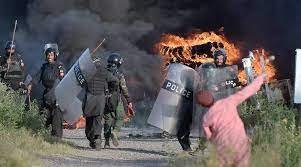Pakistan was plunged into chaos following the arrest of former Prime Minister Imran Khan, who was also the chief of the Pakistan Tehreek-e-Insaaf (PTI) party, on May 9, 2023. While the Pakistan Supreme Court declared his arrest unlawful and the Islamabad High Court granted him bail for two weeks in the crucial Al Qadri Trust Case, the political climate remains tense, with the government, PTI, establishment, and judiciary taking strong positions. This article delves into four key trends that emerged from this tumultuous situation, highlighting the deterioration of Pakistan’s already challenging circumstances.
The response of the PTI supporters to their leader’s arrest serves as an indicator of Imran Khan’s popularity. The country witnessed a significant escalation of violence, with PTI supporters taking to the streets from Peshawar to Karachi. Notably, the violence was not random or indiscriminate; it primarily targeted the establishment, its infrastructure, and senior military figures. Attacks were directed at prominent locations such as the Corps Commander’s residence in Lahore, the Frontier Corps Headquarters in Lahore, and the General Headquarters (GHQ). Anti-Army slogans were chanted, and Army vehicles were pelted with stones. Numerous videos documenting these attacks circulated widely, emphasizing the extent of the unrest.
Imran Khan’s arrest on the premises of the court, coupled with a scathing press brief by the establishment’s Inter-Services Public Relations (ISPR), further exacerbated tensions between the PTI and the establishment. The arrest on court premises, which some perceive as a violation of sanctity, garnered significant attention and drew criticism from both domestic and international observers. The subsequent press brief by the ISPR added fuel to the fire, intensifying the rift between the PTI and the powerful establishment.
The judiciary played a pivotal role in the unfolding events. While the Pakistan Supreme Court declared Imran Khan’s arrest unlawful, it was the Islamabad High Court that granted him bail for two weeks in the Al Qadri Trust Case. This decision was viewed as extraordinary relief by many, given the gravity of the charges against Khan. Such an act from the judiciary not only showcased the independence of the legal system but also raised questions and skepticism about the potential influence of political and external factors.
The combination of Imran Khan’s arrest, violent protests, strained PTI-establishment relations, and the judiciary’s intervention highlights a deepening political crisis in Pakistan. The existing fault lines between the government, PTI, establishment, and judiciary have become more pronounced. The escalation of violence, particularly with the targeting of military institutions, threatens the stability of the country and raises concerns about the potential for further unrest and polarization.
The arrest of Imran Khan, the subsequent response by PTI supporters, and the ensuing violence have worsened an already challenging situation in Pakistan. The strained relations between the PTI and the establishment, coupled with the extraordinary relief granted by the judiciary, have deepened the political crisis. Pakistan finds itself at a critical juncture, where maintaining stability and fostering dialogue between all stakeholders will be crucial to charting a path towards resolution and preventing further deterioration of the situation.


